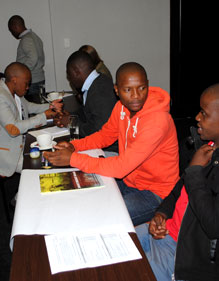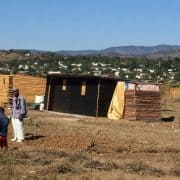|
Getting your Trinity Audio player ready...
|
 Transparency International (TI) and its South African chapter Corruption Watch held a workshop on youth and corruption in Johannesburg in early May. Delegates from South Africa, Zambia and Zimbabwe took part in the discussion, which centred on the goal of building an environment which enables young people to thrive in all facets of society without being affected by corruption.
Transparency International (TI) and its South African chapter Corruption Watch held a workshop on youth and corruption in Johannesburg in early May. Delegates from South Africa, Zambia and Zimbabwe took part in the discussion, which centred on the goal of building an environment which enables young people to thrive in all facets of society without being affected by corruption.
TI seeks to achieve this goal by involving youth in anti-corruption activities; by advocating for the inclusion of corruption issues in national youth programming; and by urging the development of laws and regulations that uphold the rights of youth, among others.
Such workshops also further TI’s strategy by equipping delegates with knowledge and awareness to stand up to corruption.
After an introduction to corruption, the participants, many of whom are associated with organisations that work with youth in communities, decided on the main themes which they felt would affect them most. The themes were the understanding of corruption; sexual exploitation; and corruption in education.
“This workshop has opened up a lot of things that I didn’t know, and gives me ideas and things to delve into,” said a delegate. “I have also realised that corruption in different countries takes the same form, even though the words to describe it are different.”
Another participant said that her eyes had been opened to the fact that as a student, she has already experienced corruption in many ways. “It hurts me a lot to realise that there are other learners out there, because it starts in schools, who suffer from this.”
She also remarked on the fact that the people who are supposed to offer protection to citizens, are often the same ones who are corrupt, for example the police. “I think that because the people who are supposed to protect us are not doing that, it’s my responsibility to go out there and inform these youth about corruption, so that they know what they’re up against and in that way, they can protect themselves through that knowledge.”
A Zambian delegate from the private sector said that corruption affects youth more than we think. “We do a lot of government business and private business as well, and there are many dark points that we need to focus on, such as soliciting. We must open our minds and stay cautious.”
African youth vulnerable to corruption
Africa is the world’s youngest continent in terms of age: 70% of the population is under the age of 30, a fact mentioned by UN secretary-general Ban Ki-Moon in his 2011 Africa Day message, among others at various places and times. Young Africans face major challenges in that jobs are scarce, as are opportunities to participate in decision-making processes – this despite advances in education and economic growth.
The situation is worsened by corruption, which affects youth more than other age groups, since poor or no mechanisms exist to cushion them from corruption and its effects.
TI has been comprehensively engaging young people for more than a decade in various countries, through peer facilitation to the youth communities in local areas and national level, raising awareness and research on integrity and youth for transparency and integrity clubs among other initiatives.
Corruption Watch has also made South African youth a focus of its operations, through its schools campaign and the upcoming youth campaign.








